Toxic Air Concerns
The capital city of Delhi found itself enveloped in a blanket of severely compromised air quality. The air quality deteriorated to the point where it was
classified as 'very poor,' leading to a significant health risk for citizens. This issue brought about considerable consternation, raising concerns among residents and health experts regarding the detrimental impact on respiratory health. The severity of the air quality presented itself as a persistent concern, prompting urgent discussions and the need for immediate actions to mitigate the adverse health effects that were being observed. The situation spurred reactions from political figures and parties, each presenting varied perspectives on the contributing factors to this alarming situation.
Political Accusations Emerge
As the air pollution crisis intensified, the political landscape in Delhi witnessed a surge in accusations and counter-accusations. Various political groups began to trade blame, with the central focus being to pinpoint the source of the air pollution. The Bharatiya Janata Party (BJP) directed its criticism toward the Aam Aadmi Party (AAP) government, as well as the AAP-led government in the state of Punjab, for what they perceived as negligence related to actions like stubble burning. Conversely, the AAP government refuted these claims. The accusations underscored the political nature of the environmental crisis, with each party attempting to deflect accountability and maintain political leverage amid the public health emergency. This intensified the need to address the problem.
Blame on Punjab's Stubble Burning
A significant point of contention was the issue of stubble burning, primarily in the neighboring state of Punjab. The BJP placed the responsibility for the city's poor air quality on the AAP government in Punjab, alleging that inadequate measures had been taken to prevent or mitigate the burning of crop residue by farmers. This act was identified as a critical factor in contributing to Delhi’s severe air pollution. The BJP's stance was centered on the conviction that the AAP government's failure to regulate or manage stubble burning was a primary cause of the city's environmental degradation. Consequently, this action led to increased pressure on the AAP to respond to these charges and defend their actions in handling the issue of air pollution. The accusations brought about public discussions.
AAP's Counter-Arguments
In response to the accusations from the BJP, the AAP government of Delhi firmly refuted the claims, defending its actions and challenging the accusations. They sought to counter the blame being leveled against them. The AAP pointed to other factors that impacted air quality and denied that they were solely responsible for the crisis. The counter-arguments implied that the BJP was attempting to deflect attention from its own failures by assigning blame to them. Through their responses, the AAP aimed to establish their position and to create a more nuanced understanding of the situation. This involved highlighting complexities, demonstrating other components that contribute to poor air quality, and promoting their own policies and measures to tackle pollution. The AAP’s defense was crucial in the public dispute.
Diwali Firecracker Controversy
The use of firecrackers during Diwali was a major subject of the political debate. BJP was reluctant to completely focus on Diwali's fireworks as the key reason for the pollution. The accusations from both sides centered on the degree to which these factors contributed to the air quality. The debate showcased the political sensitivity of the festival, with each party seeking to balance their response in consideration of both environmental health and the cultural importance of the Diwali celebrations. This situation also put pressure on officials to address public concerns while managing the varying demands and opinions within the political field. The discussion also sparked the need for a comprehensive strategy, considering the many factors contributing to air pollution.
Calls for Reflection
Amidst the escalating blame game, various voices emerged that called for self-reflection and a more collaborative approach to tackle the air quality crisis. The TMC MP, Mahua Moitra, was one of the prominent figures who advocated for the need to assess the different factors that impacted the air quality in Delhi. This call for reflection indicated a shift away from finger-pointing and toward finding comprehensive, sustainable solutions. The intention was to emphasize the complexity of the problem and urge all stakeholders to collaborate. The shift underscored the need for a non-partisan approach to address environmental challenges. This move was thought to be essential for the formulation and implementation of effective strategies to mitigate pollution and enhance Delhi’s overall air quality for the benefit of all citizens.













